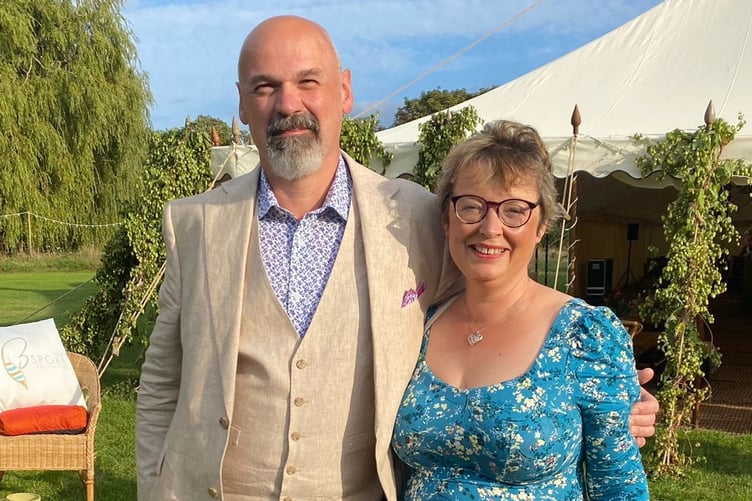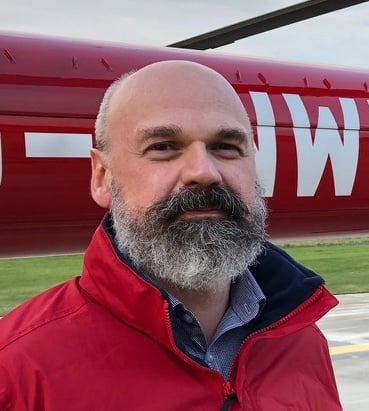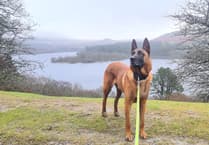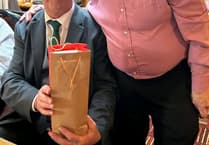A WHISTLEBLOWER who won his case against a high-profile charity has spoken of the personal toll.
An employment tribunal found that Steve Murdoch was unfairly dismissed from his role at the Cornwall Air Ambulance Trust (CAAT) after he brought concerns over the recruitment of its new CEO to light.
With a further compensation hearing having originally been scheduled to take place this week, CAAT has now come to an out of court settlement with Mr Murdoch for an undisclosed but “fair and reasonable sum” to compensate him for his losses.
The Charity Commission has begun an investigation into governance at the Trust.
Mr Murdoch, who lives in Widegates, began working for the Cornwall Air Ambulance in 2010. In 2018 he was appointed as chief operating officer of the organisation, and became interim chief executive in February 2021, following the sudden resignation of then boss Paula Martin.
Mr Murdoch was one of six shortlisted from 140 applicants for the permanent CEO role. The tribunal heard that in the period between selection and confirmation of the new CEO (referred to as Mr X, due to reporting conditions imposed by the court), Mr Murdoch learned of several inaccuracies in Mr X’s CV.
Mr Murdoch took his concerns to the board of trustees: he felt that in misrepresenting himself and overstating his achievements, Mr X had demonstrated that he was not suitable to be in the most senior role. The Finance Act sets out that those leading a charity must be registered with HMRC as ‘fit and proper persons’ and reasons for not fulfilling this description might include fraudulent behaviour such as misrepresentation.
Mr Murdoch’s second concern was that in making an unconditional offer to appoint Mr X without first carrying out reference and employment checks, the trustees would be failing in their legal duties.
Chair of the Board Mark Carne, a former head of Network Rail, was appointed to internally investigate. Mr Murdoch was unhappy that Mr Carne, who had led the recruitment process, was in effect “marking his own homework” and he proceeded with a formal whistleblowing submission.
An external investigation concluded that Mr X had deliberately misled the Trust in relation to the errors on his CV “in order to gain an advantage” .
The Trust “ignored the report” says Mr Murdoch: Mark Carne argued that the CV falsehoods were “minor”, “a naive and stupid mistake” and wouldn’t have prevented the trustees from offering Mr X the job.
In the meantime, Mr Murdoch says he was subjected to unfair treatment by trustees Ben Mark and Chris Pomfret. The tribunal found that these “very senior figures had told Mr Murdoch that his acts of whistleblowing had damaged or destroyed the trust they and the Board had in him in his role” and that “there was no reasonable, proper cause for doing so”.
“I was told it would cost me my job,” Mr Murdoch says. “I was shocked by the actions of the trustees towards me.”
CAAT disputes the content of conversations between the two trustees and Mr Murdoch, but the tribunal found that he had been treated detrimentally.
Mr Murdoch had requested a copy of the report into his whistleblowing concerns: the Trustees sent him a brief letter. The Trust says this was done on legal advice, but this act was counted as a third detriment by the tribunal.
Mr Murdoch resigned from the Cornwall Air Ambulance Trust in August 2021. He attempted mediation ahead of the employment hearing, but the trustees, the tribunal found, adopted “an aggressive stance”.
The tribunal’s judgment concluded that Mr Murdoch had raised legitimate protected disclosures in the public interest, that the trustees of the charity had acted unlawfully by subjecting him to detriments as a whistleblower, and that his resignation was Constructive Unfair Dismissal.
Mr Murdoch’s claim that he had been “automatically unfairly dismissed” due to the whistleblowing was not successful: the court found that there was a 75 per cent chance he would have resigned anyway, due to his wish not to continue under a “dishonest” boss and a board in whom he had lost trust and confidence.
The 70-page judgement documents a torrid period at the Trust with interactions amongst Trustees, and between board and staff, becoming toxic. The health of several at the organisation was affected, and relationships were fractured.
Mr Murdoch has been accused more than once of “sour grapes” – but the tribunal found that he had raised his concerns out of “justified and reasonable concerns for the charity” – and not through malicious interest or for personal gain.
Chair of the board Mark Carne resigned the day after the last court hearing. Ben Mark then became the Trust’s chair, but in a statement the Cornwall Air Ambulance Trust now says: “We have begun the process of recruiting a new Chair and a number of new trustees in order that the board can best continue to support the volunteers, charity staff and crew in doing the lifesaving work they do for the people of Cornwall and the Isles of Scilly.
“The board of trustees have always been, and continue to be, wholly supportive of our CEO and believe he has demonstrated in the last two and a half years exceptional commitment to the charity, its staff, volunteers and donors, helping our teams deliver outstanding impact and results.
“Each of us as trustees are volunteers and we always aim to do everything in the best interests of the charity. We are also human, and we don’t always get it right, and on this occasion some mistakes were made that led to us losing some elements of this case.
“We have begun a thorough review of all Board governance.”
Mr Murdoch has returned to the type of work in the aviation industry he had been doing prior to 2010 and is currently managing the upgrade of air traffic control systems at a major regional airport.
“I have only whistleblown once in my career - it ended my career,” he says.
“I was interviewed for another senior role in a charity but its trustees felt that the whistleblowing case was a distraction. I feel that I’m stigmatised.
The emotional impact has been profound.
“I’d been in high pressure jobs but I had never experienced symptoms of stress, anxiety and depression like this. I’ve had problems sleeping ever since and I struggle with concentration.
“It’s been difficult financially - my legal fees have run to £100k plus and I spent a year trying to find work.”
Mr Murdoch says he is “heartened by the court judgement” which makes him feel he did do the right thing.

“This has been a long running legal case and it is good to bring the case to conclusion without further court hearings and legal expenses.
"I have not received an apology from the trustees of the charity for their actions"
He is now working with Protect - a charity supporting whistleblowers – and the think tank Parrhesia, which researches the issue.
“I think whistleblowing is quite hard for charities to deal with. For the individual, it is an isolating experience.
“Whistleblowers are supposed to be protected by law, but if your employer acts to isolate or intimidate you, your only option is the courts.”





Comments
This article has no comments yet. Be the first to leave a comment.